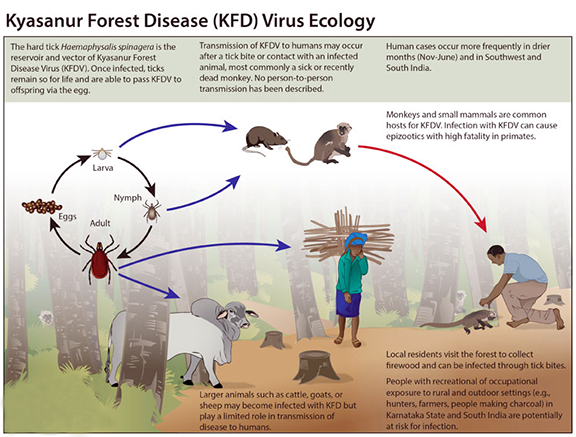Social Justice
Kyasanur Forest Disease
- 22 May 2021
- 3 min read
Why in News
A new point-of-care test has been found to be highly sensitive in the rapid diagnosis of Kyasanur Forest Disease (KFD).
- This disease is also known as monkey fever.
Key Points
- Point-of-care Test:
- About:
- It is developed by Indian Council of Medical Research (ICMR)-National Institute of Virology.
- It includes a battery-operated Polymerase Chain Reaction (PCR) analyser, which is a portable, lightweight and universal cartridge-based sample pre-treatment kit and nucleic acid extraction device that aid in sample processing at the point of care.
- Benefits:
- It would be beneficial for the diagnosis of KFD as the outbreaks mainly happen in remote areas, where there is lack of well-equipped sample handling and laboratory testing facilities.
- It would be useful in quick patient management and controlling further spread of the virus.
- About:
- Kyasanur Forest Disease:
- About:
- It is caused by Kyasanur Forest disease Virus (KFDV), which primarily affects humans and monkeys.
- It was first identified in 1957 in a sick monkey from the Kyasanur Forest in Karnataka. Since then, between 400-500 human cases per year have been reported.
- Eventually, KFD emerged as a grave public health problem spreading through the entire Western Ghats.
- Transmission:
- In nature, the virus is maintained mainly in hard ticks (Haemaphysalis spinigera), monkeys, rodents and birds.
- To humans, it may occur after a tick bite or contact with an infected animal (a sick or recently dead monkey).
- Symptoms:
- Characterised by chills, frontal headache, body ache, and high fever for five to 12 days with a case fatality rate of 3 to 5%.
- Diagnosis:
- Diagnosis can be made in the early stage of illness by molecular detection by PCR or virus isolation from blood.
- Later, serologic testing using Enzyme-linked Immunosorbent Serologic Assay (ELISA) can be performed.
- Treatment and Prevention:
- There is no specific treatment for monkey fever.
- A vaccine (Formalin inactivated KFDV vaccine) does exist for KFD and is used in endemic areas of India.
- However, it is found that vaccines are not effective once the person is infected with fever.
- About:







